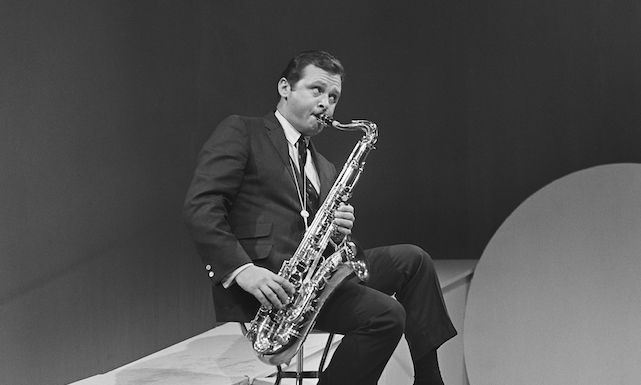Jan 13, 2026 2:09 PM
More Trump-Kennedy Center Cancellations
The fallout from the renaming of the John F. Kennedy Center for the Performing Arts to include President Donald…

Before Jazz Samba hit in 1962, saxophonist Stan Getz appeared to be on a different trajectory.
(Photo: Lee Tanner)It’s late in fall of 1961, and tenor saxophonist Stan Getz is playing The Village Gate in New York. It’s before the bandleader would cultivate worldwide popularity and a streak of Grammy nominations for now iconic albums like Jazz Samba (1962) and Getz/Gilberto (1964), which contained one of the biggest crossover hits of all time, “The Girl From Ipanema.”
His quartet is in exceptional form on Nov. 26, with the saxophonist blowing uncharacteristically aggressive solos. Cole Porter’s “It’s Alright With Me” opens the set, Getz forming shapely fire as drummer Roy Haynes counterpunches his every note. Two ballads follow, before Getz introduces Miles Davis’ “So What”; oddly, what follows is a 12-minute take of John Coltrane’s “Impressions.”
Throughout two sets that night, Getz covered familiar ground, but also went for broke on “Woody ’N You,” a sparkling “Yesterday’s Gardenias,” an ascending “It’s You Or No One” and a cathartic version of “52nd Street Theme.”
Recorded to quarter-inch tape by lighting designer Chip Monck, the performance was stored and forgotten. Producer Richard Seidel recently discovered the tapes and assembled Getz At The Gate: The Stan Getz Quartet Live At The Village Gate, Nov. 26, 1961, which comes as a double CD or triple LP through Verve/Ume.
“This is Stan at his most aggressive that I’ve ever heard him,” said producer Ken Druker. “Things like ‘Airegin,’ he really goes for it. ‘Yesterday’s Gardenias’ really jumped out at me. From ‘It’s Alright With Me,’ you know you’re in for a ride, because it sounds like a different Stan. He’s just back from Europe. I think he’s having a hard time finding bands to work with, if he’s not alienating them or firing them.”
Live At The Village Gate adds another dimension to the saxophonist’s storied discography, but the discovery’s a curious one. Why wasn’t it issued soon after being captured on tape?
“It sounds like it was recorded to be issued,” Druker said. “It’s not a radio show. Announcer Chip Monck says at the top, ‘We’re here recording for Verve Records.’ But this never appeared anywhere as a potential recording to release. I’m guessing it was recorded in 1961 and then Jazz Samba hit soon after, and this recording was forgotten, because Getz went in a whole different direction.”
Steve Kuhn, who plays piano on the recording and worked with Getz for four years, suggested an alternate possibility: “Stanley was always very critical of his own playing, so he probably didn’t want it to be put out.”
Hypercritical of himself and his musicians, Getz could be a tough taskmaster, his battles with substance abuse being well documented.
“My father was the kindest guy when he was sober,” Nick Getz, the bandleader’s son, wrote in an email. “He had a wicked sense of humor, and was so smart and fun to be around. However, the minute drugs and alcohol touched his lips, he became a violent monster. Sometimes, he would arrive late for concerts, profusely sweating and having bloody knuckles from who knows what. But as soon as he picked up that saxophone, the demons instantly vanished.”
Despite all the baggage, though, Getz’s aptitude and sprawling discography remain his overwhelming legacy.
“He was very paranoid about Coltrane,” Kuhn recalled. “Stanley felt that Coltrane was ‘the guy’ in the early 1960s, but that was unnecessary. Stanley had a beautiful sound. He called himself ‘the Jewish Lester Young’ and Paul Desmond ‘the Christian Stan Getz.’ He felt he stood between the two. He had such a wonderful sound.” DB

Belá Fleck during an interview with Fredrika Whitfield on CNN.
Jan 13, 2026 2:09 PM
The fallout from the renaming of the John F. Kennedy Center for the Performing Arts to include President Donald…

Peplowski first came to prominence in legacy swing bands, including the final iteration of the Benny Goodman Orchestra, before beginning a solo career in the late 1980s.
Feb 3, 2026 12:10 AM
Ken Peplowski, a clarinetist and tenor saxophonist who straddled the worlds of traditional and modern jazz, died Feb. 2…

The success of Oregon’s first album, 1971’s Music Of Another Present Era, allowed Towner to establish a solo career.
Jan 19, 2026 5:02 PM
Ralph Towner, a guitarist and composer who blended multiple genres, including jazz — and throughout them all remained…

Rico’s Anti-Microbial Instrument Swab
Jan 19, 2026 2:48 PM
With this year’s NAMM Show right around the corner, we can look forward to plenty of new and innovative instruments…

Richie Beirach was particularly renowned for his approach to chromatic harmony, which he used to improvise reharmonizations of originals and standards.
Jan 27, 2026 11:19 AM
Richie Beirach, a pianist and composer who channeled a knowledge of modern classical music into his jazz practice,…